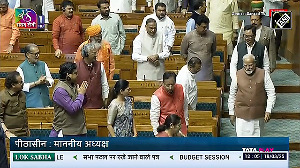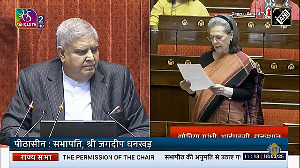A few days back the Maoists abducted Atindranath Dutta, the officer in charge of the Sankrail police station in West Bengal and killed two of his colleagues. After 55 hours in captivity, Dutta was released in the presence of the national media by Maoist leader Kishenji who underlined that this was the 'first case of release of Prisoner of War' by the Maoists.
Dutta's release came hours after the state government let 22 alleged Naxals walk free by not opposing their bail plea. The West Bengal government later admitted that it gave in to the demands of the Maoists to secure the release of the police officer and cited the release of militants in the 1989 Rubaiya Sayeed kidnapping case and the 1999 IC-814 hijack as precedents.
The state home secretary went to the extent of calling India a 'soft State' while the chief minister's principal secretary admitted that the government "had to bend over backwards'.
This prisoner swap happened even as the security forces had surrounded the Maoist abductors with their leader Kishenji also part of the squad. They were instructed to call off their operations. This incident once again underscored the growing might of the Maoists and the abject passivity of the Indian State even when its own institutions are assaulted with impunity.
Emboldened by their 'victory' armed tribals led by Maoists seized the Bhubaneswar-New Delhi Rajdhani Express near Jhargram in West Midnapore, took the driver and his assistant hostage, and demanded Chhatradhar Mahato's release. Meanwhile, the politicians are busy blaming each other for being supporters of the Maoists even as it is clear that no political party is above board when it comes to flirting with extremists for short-term political gains.
For some time now we have been hearing the Indian government talking of Naxalism and Maoism in grave terms, labeling them as the greatest internal security threat facing the nation. Yet the policy response has not been up to the mark. It has been full of sound and fury signifying nothing.
The United Progressive Alliance government in its first term failed to see the Naxalite threat for what it was -- one of the most significant challenges to the very existence of India. As a result its response was a mixture of denial, accommodation, and neglect.
With the Left parties as coalition partners and an ineffective Shivraj Patil as the home minister, the government ended up worsening an already serious situation, giving ample opportunities to the Naxalites to demonstrate their might across an ever expanding swathe of territory called the 'Red Corridor'.
For years Naxals have been killing security personnel and civilians continuously and consistently with a ruthlessness that is unprecedented but the Indian State has tended to look the other way while celebrity activists have tended to justify these acts on all sorts of moral grounds.
In the absence of leadership from New Delhi, the states decided to chart their own courses and their approaches ranged from offering amnesties to the raising of armed militias like the Salwa Judum.
Realising that the situation has got out of control, the UPA government in its second term had no option but to take the threat head on and its started with the new Home Minister P Chidambaram admitting in Parliament that the national security threat posed by the Maoists has been underestimated for the last few years.
Conventional wisdom on tackling Naxalism much prevalent amidst the Indian liberal intelligentsia suggests that this is a mere socio-economic problem. And only if we can provide jobs to the disaffected youth and win their hearts and minds, we can prevent Maoism from spreading.
This assumption is the basis for the developmental package that the government has announced for Naxal-infested areas where significant development aid is now being channeled in the hope this will help in alleviating the perception of alienation from the national mainstream.
It is true that good governance and economic has simply passed over certain parts of India, and Naxalites thrive in this developmental and governance vacuum, often supplanting the State's legitimacy. And as the state's authority has eroded, Maoists have moved in to fill this vacuum by erecting parallel structures of governance. Development, however, is never the goal of such movements. It is all about power.
A multi-pronged strategy is needed to tackle Naxalism and one of the planks will have to be to ensure that the developmental aid trickles down to those at the very bottom of the nation's socio-economic ladder. But this should not mean that the military defeat of Maoists should be put on the back-burner. For far too long there has been a complacent attitude regarding fighting these forces.
There has been an absurd sentimentality about the Maoists' leftist pretensions. The argument went that these are idealistic, well-intentioned people who have gone awry but soon they will recognise the benefits of participatory democracy and start engaging with the nation's electoral process.
The Congress party remained ambivalent about defeating Maoism and we kept hearing cliches suggesting that development was the only way to tackle the menace of Naxalism and the Maoists were merely disaffected youth.
It is surprising because India has been rather ruthless in fighting other challenges to its internal security, be it in Jammu and Kashmir or in the northeast where all kinds of insurgencies have challenged the might of the state and the state has never been diffident in responding in kind.
As the home minister has pointed out, left-wing extremism affects 20 states, and over 2,000 police station areas in 223 districts in those states. While 231 security personnel were killed in Naxalite violence in 2008, 250 had already died this year till August. Despite this the Naxalites have continued to be seen as misguided or harmless or even basically right in what they wish to achieve though perhaps a bit too harsh in their choice of means.
The Maoists have made it clear time and again that they seek the dismemberment of the Indian State and have cynically exploited the genuine grievances of the local population in their areas of operation toward their larger ideological ends.
The Indian intelligentsia and the Indian government should disabuse themselves of any possible reconciliation with the Maoists at this juncture. The Maoists have asserted that they will only come to the negotiating table if security forces are withdrawn from their areas of operation, all arrested Maoists are released and there won't be any precondition of laying down arms.
There should be no question of accepting any of these demands. The extremism of their goals and the excesses of their method make them the most dreaded enemies of the Indian State.
The main task of great urgency before the Indian government today, therefore, is a military defeat of the anti-democratic Naxal forces. The Indian government needs to re-establish its authority, creating conditions for pursuing and inclusive political process and developmental agenda.
As recent events make amply clear, India has been failing its paramilitary and police consistently. In the absence of adequate personnel, training and equipment, the Indian police have been reluctant to take on the Maoists head on making it even more difficult for the local population to challenge the Naxal's writ.
In the absence of adequate security, a 'hearts and minds' strategy is unlikely to work and the local populace will continue to get targeted by both the Naxals and the security forces.
In this context while the recently launched Operation Green Hunt against the Naxal movement is a step in the right direction, the government will have to think about building institutions of governance rather rapidly after clearing the areas of the Maoist cadre if wants a permanent solution to this problem.
The Maoist insurgency is a blatantly illegal and no holds barred war against the Indian State, against the idea and existence of the Indian democracy -- and that includes the poor tribals and farmers in whose cause Maoists claim to fight. It is not only ignorant but also extremely dangerous to romanticise the Naxal cause.
While recognising the limits of Indian democracy and developmental model, there is no need to be apologetic about the ability of the Indian democracy in bringing ever greater number of people, especially the marginalised, into the mainstream.
Today it is the Maoists who because of their destructive tactics and senseless violence are actually the greatest impediment to the development of the areas for whom they are ostensibly fighting.
It is time for the Indian State to assert itself as well as expose the intellectual vacuity of their ideology. Anything less would allow such forces to keep working towards the weakening of the Indian State.
Harsh Pant teaches at King's College London and is presently a visiting professor at the Indian Institute of Management-Bangalore.








 © 2025
© 2025